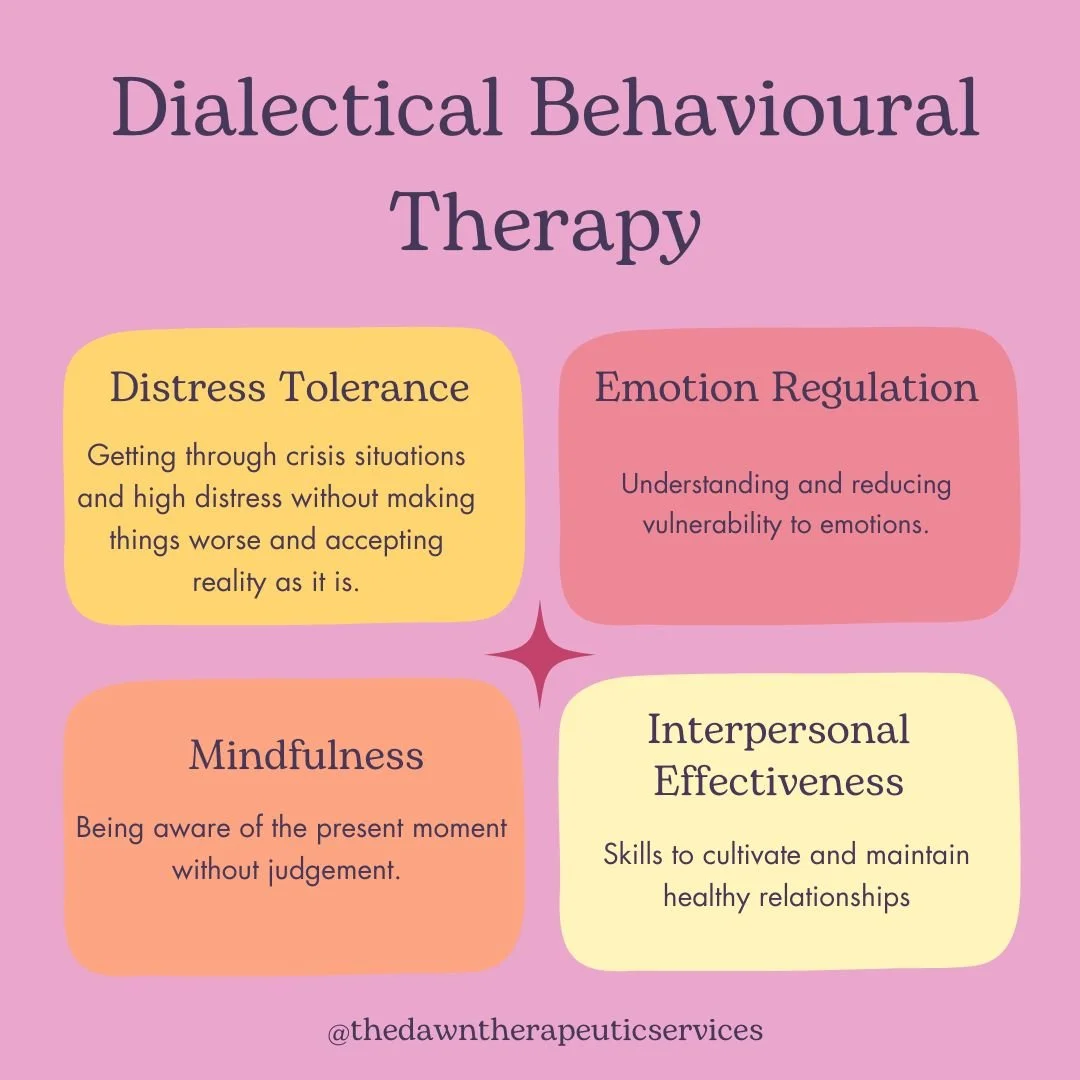Demystifying Dialectical Behavioural Therapy (DBT)
DBT is a form of cognitive behavioural therapy that is designed to help you understand and manage difficult and intense emotions and high levels of distress. DBT has mostly been associated with the treatment of personality disorders, in particular Borderline Personality Disorder, but has been shown to be effective with stabilising symptoms of trauma, mood disorders, substance abuse, eating disorders, and where self-harm and suicidality are presenting issues.
The History of DBT
Marsha Linehan, a psychologist and researcher at the University of Washington, is credited with developing DBT. Linehan's work was initially focused on treating individuals with Borderline Personality Disorder (BPD), a condition characterised by intense emotional instability, self-harming behaviours, and troubled interpersonal relationships.
Linehan's innovation was to integrate principles from cognitive-behavioral therapy with concepts from dialectical philosophy and mindfulness practices. The term "dialectical" refers to the synthesis of opposites; in the context of DBT, this often involves balancing acceptance and change. This unique combination aimed to validate the individual's experiences while encouraging positive behavioural change.
What is DBT Therapy?
DBT is structured around the concept of dialectics, which emphasises the coexistence of opposing forces and the need for balance. It incorporates strategies from various therapeutic approaches, such as cognitive-behavioral techniques, mindfulness practices, and acceptance strategies. The core philosophy of DBT is that life is a series of dialectical dilemmas, and therapy involves finding a balance between acceptance and change.
DBT involves individual therapy sessions, group skills training, phone coaching, and therapist consultation teams. This multifaceted approach provides comprehensive support to individuals, helping them develop practical skills for managing emotional distress and improving their quality of life.
The Four Core Modules of DBT
DBT skills training is divided into four core modules, each addressing different aspects of emotional and behavioral regulation:
Mindfulness: This module teaches individuals to focus on the present moment and observe their thoughts and feelings without judgment. Mindfulness is foundational in DBT, as it enhances self-awareness and helps individuals stay grounded during emotional turbulence.
Distress Tolerance: In this module, individuals learn techniques for tolerating and surviving crises without engaging in coping strategies that may often make things worse (eg. substance use, violence, withdrawal from school/work/relationships). Skills include distraction, self-soothing, and radical acceptance, all aimed at managing short-term pain and preventing impulsive actions.
Emotion Regulation: This module focuses on understanding and managing intense emotions. Individuals learn to identify and label emotions, increase psychological flexibility, increase positive emotional experiences, and reduce vulnerability to negative emotions through practical strategies.
Interpersonal Effectiveness: This module provides tools for building and maintaining healthy relationships. Skills include assertiveness, setting boundaries, and effectively communicating needs and desires while maintaining self-respect and nurturing positive connections.
Limitations of DBT
While DBT is highly effective, it is not without limitations:
Intensity and Commitment: A full DBT program requires a significant time commitment, often involving weekly individual and group sessions, which can be demanding for those with busy schedules or limited access to resources. However, it also the intensity of touch points in DBT that contributes to effective change.
Accessibility: Access to trained DBT therapists and programs can be limited, particularly in rural or underserved areas, making it difficult for some individuals to receive the full spectrum of DBT services.
Cost: A full DBT program can be a significant financial investment. Rebates or funded pathways may be available to help offset the out of pocket expenses. However, also considering the cost of not engaging in effective therapy for chronic and high risk mental health conditions is also worthy of consideration.
Not every therapy works for everyone: While DBT is highly effective for many, some individuals with severe mental health conditions may not respond fully to DBT and may require additional or alternative treatments. The Dawn incorporates other treatment modalities including EMDR, Parts Work, Play/Art/Creative therapies where appropriate, and where DBT may not meet the need.
DBT is one of primary therapeutic approaches used at The Dawn Therapeutic Service. DBT is used to help move clients just talking about distress and pain, to having practical skills and approaches to manage difficult feelings and thoughts and create stability after trauma or mental health challenges.
If you are seeking DBT for yourself or your adolescent, please reach out via the Contact page.
Nicole Staats
Accredited Mental Health Social Worker (AMHSW)


